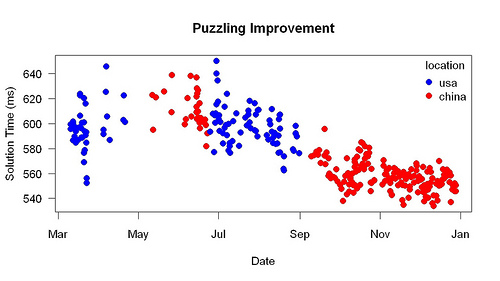This graph shows results from a test of simple arithmetic (e.g., 7-3, 4*8) that I did once or twice most days. Starting in August, I improved about 9% (from 600 to 550 msec/problem).
I don’t know why I got faster. In early September I moved from Berkeley to Beijing. After the move there was an especially sharp decrease. The increase in October was due to an experiment in which I reduced flaxseed oil/day.
I noticed the decrease after I got to China. At first, I thought it was due to a dietary change — perhaps more walnuts. I stopped eating walnuts and the improvement didn’t go away. So it’s not walnuts. It’s not butter; for the first few months in China, I ate the same butter as in Berkeley.
I can’t think of any plausible conventional explanation (e.g., blueberries). Here are the most plausible explanations I can think of:
1. Less aerobic exercise. In China I get much less aerobic exercise than in Berkeley.
2. Less vitamins. In China I consume less vitamins than in Berkeley.
3. Warmer. My Beijing apartment is warmer than my Berkeley apartment. Showers in Beijing are warmer than baths in Berkeley.
In each case the change (e.g., less exercise) could have started in Berkeley. The last one (warmer) is not just the strangest, it’s also the most plausible. Unlike the other two, evidence supports it. Fact 1: When I started heavy-duty cold showers my scores started to get worse. Fact 2: When I stopped cold showers, the scores returned to their pre-cold-shower level. Fact 3: When I moved to China it was very hot, which would explain the sharp decline at that time.

Seth, just a note to say that as a fellow cognitive psychologist, I really appreciate all the info on your site! However, looking at the figure above, I am unable to see the pattern that you describe. If you were to add a trend line to the data, I bet you would see it pretty much describing a straight line which declines from around 620ms in June to perhaps 550ms in January. This would imply that your improvement is independent of geographical location, so perhaps you are simply getting better at these types of tasks. Am I missing something? Regards, neuroscan
Bravo.
I too notice that winter productivity really takes off, when I can wear warm clothes and work in a cold room.
I recently replaced fruit and much of my carb intake with lots of boiled eggs to maximize testosterone production. The extra fat calories successfully killed most carb cravings. The eggs seem to allow a much higher mental labor endurance.
I’m collecting data at the moment but not processing it, but anyway the change is dramatic enough to notice unaided.
neuroscan, the usual line I use to summarize this data (lowess in R, using the default parameters) is flat from March to July, then declines. I thought that was misleading because the months-long decline doesn’t start until August. So I omitted it. As you say there might be a small increase and decline in June (in China). Maybe due to too-old flaxseed oil. The August-September decline isn’t due to practice because before the decline the scores were roughly flat for about a year (August 2009 to July 2010), except for a sudden improvement apparently due to butter. For example, compare March and July.
Seth, would you be interested in testing the effects of hotter-than-normal showers?
Zans, yes. I am curious about the effect of showers. Hotter than normal showers would be unpleasant so I may try (a) varying how often I shower (twice/day instead of once/day), (b) varying the length of showers (e.g., 2 minutes versus 10 minutes), and (c) very cold showers (again).
Those would be some worthwhile experiments. I’ve tried looking up information on how showers affect one’s health last year but there was very little literature on the subject. Have you tried varying the time of day when you take the shower as well?
Speaking of cold showers, do you still think there might be some benefit to them, or are you mainly checking if the new results are consistent with the old ones?
I haven’t tried varying the time of day I take the shower. Since the effect appears slowly (over days) it’s hard to see why time of day would matter.
I want to try cold showers again to see if I get the same results. That such a thing could affect mental speed is a new and intriguing idea.
I tried cold showers for a week but abandoned them after realizing they made me extremely sleepy about 2 hours afterwards. It was the oddest thing. Cold shower at 7am, which was stimulating for about an hour, a big cup of coffee at 8am, as usual, and then by 9am it was time for a nap.
if your brain were really working well, it would be able to figure out why.
What rules out a long term or cumulative benefit from higher butter consumption?
David, the effect of butter was immediate. It did not get larger over the following months.
My first assumption would be that moving to a totally different living environment causes your mind to sharpen up. You get a lot of brain-gym even at the grocery store trying to figure out what thing are edible. And the performance gain on august before moving, increased overall alertness due anticipation.
Another thing that comes to my mind is that if you’ve been learning chinese writing(even subconciously) perhaps you’ve got totally another strategy to “solve” the arithmetics, precisely, you now use your language skills and see “4*8″ as one symbol that can be translated to 24 and don’t really do math anymore, or something.
One is a bit too small sample to rule out these.
jsh, according to your brain-gym explanation, my scores should get worse when I move back to Berkeley. We’ll see.